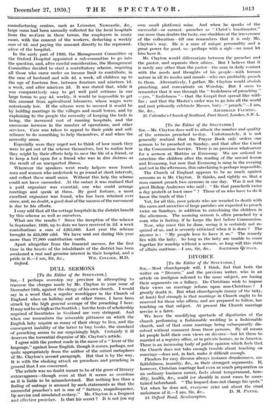DULL SERMONS
[To the Editor of the SPECTATOR.]
SHI,—I perhaps overstep my province in attempting to traverse the charges made by Mr. Clayton in your issue of December 13th, against the clergy of his own church. I would say in a word that, a regular worshipper in the Church of England when on holiday and at other times, I have been struck by the high general average of the preaching I hear. It may not be so high as the Scottish ; butthe tests of scholarship required of licentiates in Scotland are very stringent. And when one remembers the miserable pittances on which the English laity require so many of their clergy to live, and the consequent inability of the latter to buy books, the standard of preaching seems to me surprisingly high. Certainly it ill deserves the torrential dispraise of Mr. Clayton's article.
I agree with the protest made in the name of a " lover of the language," against loose English, though it comes, perhaps, not quite appropriately from the author of the mixed metaphors of Mr. Clayton's second paragraph. But that is by the way. It is with the slashing attack on preachers and preaching in general that I am concerned.
The article was no doubt meant to be of the genre of literary extravaganza—though even at that it seems as overdone as it is liable to be misunderstood. But nothing less than a feeling of outrage is aroused by such statements as that the successful preacher's art is one of " flattery, magniloquence, lip service and simulated ecstasy." Mr. Clayton is a frequent and effective preacher. Is that his secret ? It is not (on my
own small platform) mine. And when he speaks of the successful—or earnest—preacher as "Christ's toastmaster," one more than doubts the taste, one shudders at the irreverence of the collocation--till one remembers that it is only Mr. Clayton's way. He is a man of unique personality and a great power for good, so—perhaps with a sigh—we must let him have it.
Mr. Clayton would differentiate between the preacher and the pastor, and separate their offices. But I believe that it is rarely any other than the pastor—the man in daily contact with the needs and thoughts of his people—with human nature in all its modes and moods—who can profitably preach to them. Alternatively, I gather, Mr. Clayton would abolish preaching, and concentrate on Worship. But I seem to remember that it was through the " foolishness of preaching " —yes, " foolishness "—that the Gospel first spread like wild- fire ; and that the Master's order was to go into all the world and (not primarily celebrate Masses, but)—" preach."—I am,
Sir, dec., ARCHIBALD FLEMING. St. Colmnba's Church of Scotland, Pont Street, London, S.I1' .1.


































 Previous page
Previous page